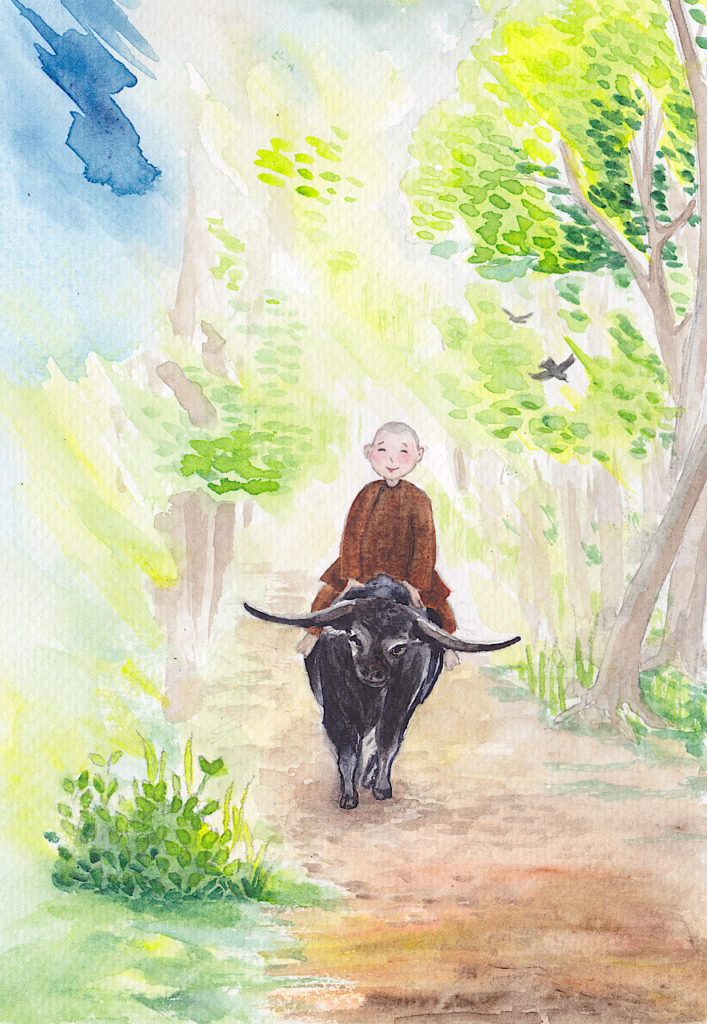
I heard these words of the Buddha one time when he was staying in the Anathapindika Monastery in the Jeta Grove near the town of Shravasti.
One day the Venerable Shariputra said to the monks, “Friends, today I want to share with you five ways of putting an end to anger. Please listen carefully and put into practice what I teach.”
The bhikshus agreed and listened carefully.
The Venerable Shariputra then said, “What are these five ways of putting an end to anger?
“This is the 1st way. My friends, if there is someone whose bodily actions are not kind but whose words are kind, if you feel anger toward that person but you are wise, you will know how to meditate in order to put an end to your anger.
“My friends, say there is a bhikshu practicing asceticism who wears a patchwork robe. One day he is going past a garbage pile filled with excrement, urine, mucus, and many other filthy things, and he sees in the pile one piece of cloth still intact. Using his left hand, he picks up the piece of cloth, and he takes the other end and stretches it out with his right hand. He observes that this piece of cloth is not torn and has not been stained by excrement, urine, sputum, or other kinds of filth. So he folds it and puts it away to take home, wash, and sew into his patchwork robe. My friends, if you are wise, when someone’s bodily actions are not kind but his words are kind, you should not pay attention to his unkind bodily actions, but only be attentive to his kind words. This will help you put an end to your anger. Someone who is wise should practice in this way.
“My friends, this is the 2nd method. If you become angry with someone whose words are not kind but whose bodily actions are kind, if you are wise, you will know how to meditate in order to put an end to your anger.
“My friends, say that not far from the village there is a deep lake, and the surface of that lake is covered with algae and grass. There is someone who comes near that lake who is very thirsty, suffering greatly from the heat. They take off their clothes, jump into the water, and using their hands to clear away the algae and grass, enjoy bathing and drinking the cool water of the lake. It is the same, my friends, with someone whose words are not kind but whose bodily actions are kind. Do not pay attention to that person’s words. Only be attentive to their bodily actions in order to be able to put an end to your anger. Someone who is wise should practice in this way.
“Here is the 3rd method, my friends. If there is someone whose bodily actions and words are not kind, but who still has a little kindness in their heart, if you feel anger toward that person and are wise, you will know how to meditate to put an end to your anger.
“My friends, say there is someone going to a crossroads. They are weak, thirsty, poor, hot, deprived, and filled with sorrow. When they arrive at the crossroads, they see a buffalo’s footprint with a little stagnant rainwater in it. They think, ‘There is very little water in this buffalo’s footprint. If I use my hand or a leaf to scoop it up, I will stir it up and it will become muddy and undrinkable. Therefore, I will not be able to remove my thirst, deprivation, heat, and sorrow, so I will have to kneel down with my arms and knees on the earth, put my lips right to the water, and drink it directly.’ Straightaway, they do just that. My friends, when you see someone whose bodily actions and words are not kind, but where there is still a little kindness in their heart, do not pay attention to their actions and words, but to the little kindness that is in their heart so that you may put an end to your anger. Someone who is wise should practice in this way.
“This is the 4th method, my friends. If there is someone whose words and bodily actions are not kind, and in whose heart there is nothing that can be called kindness, if you are angry with that person and you are wise, you will know how to meditate in order to put an end to your anger.
“My friends, suppose there is someone on a long journey who falls sick. He is alone, completely exhausted, and not near any village. He falls into despair, knowing that he will die before completing his journey. If at that point, someone comes along and sees this man’s situation, they immediately take the man’s hand and lead him to the next village, where they take care of him, treat his illness, and make sure he has everything he needs by way of clothes, medicine, and food. Because of this compassion and loving kindness, the man’s life is saved. Just so, my friends, when you see someone whose words and bodily actions are not kind, and in whose heart there is nothing that can be called kindness, give rise to this thought: ‘Someone whose words and bodily actions are not kind and in whose heart is nothing that can be called kindness, is someone who is undergoing great suffering. Unless they meet a good spiritual friend, there will be no chance for them to transform and go to realms of happiness.’ Thinking like this, you will be able to open your heart with love and compassion toward that person. You will be able to put an end to your anger and help that person. Someone who is wise should practice like this.
“My friends, this is the 5th method. If there is someone whose bodily actions are kind, whose words are kind, and whose mind is also kind, if you are angry with that person and you are wise, you will know how to meditate in order to put an end to your anger.
“My friends, suppose that not far from the village there is a very beautiful lake. The water in the lake is clear and sweet, the bed of the lake is even, the banks of the lake are lush with green grass, and all around the lake, beautiful fresh trees give shade. Someone who is thirsty, suffering from heat, whose body is covered in sweat, comes to the lake, takes off their clothes, leaves them on the shore, jumps down into the water, and finds great comfort and enjoyment in drinking and bathing in the pure water. Their heat, thirst, and suffering disappear immediately. In the same way, my friends, when you see someone whose bodily actions are kind, whose words are kind, and whose mind is also kind, give your attention to all their kindness of body, speech, and mind, and do not allow anger or jealousy to overwhelm you. If you do not know how to live happily with someone who is as fresh as that, you cannot be called someone who is wise.
“My dear friends, I have shared with you the five ways of putting an end to anger.”
When the bhikshus heard the Venerable Shariputra’s words, they were happy to receive them and put them into practice.
Translated by Thich Nhat Hanh from the Madhyama Āgama 25. It corresponds with Dutiyaāghātapaṭivinaya Sutta, Anguttara Nikāya 5.162 (PTS 3.187–3.190)






Join the conversation